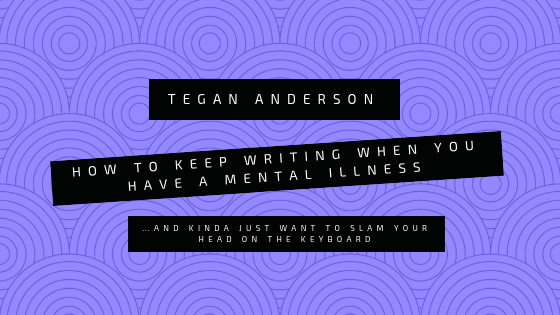Many writers (and creative people in general) struggle with mental illness, myself included. And it’s not as charming or helpful or inspiring for our work as some people try to make it seem. At the very least, writers are often stereotyped to be depressed. And I’m not joking when I say that there are people out there in the world who believe that creatives have to be mentally ill in order to create some kind of art. My opinion, in one word, is just… no.
Writing while being mentally ill (from my experience) is occasionally borderline impossible. On a good day, it can be incredibly difficult. It’s not fun and it makes you feel like quitting or missing out on opportunities or not enjoy something that you truly love. It’s a fight to keep going, and sometimes you just need support. Being stigmatised or told you’re ‘broken’ or that you should be mentally ill because you’re a creative are some of the worst and least helpful things.
So, from the experience of a writer with a mental illness, here are some things I do to keep me writing.
Make visual reminders of the good things
My brain usually likes to erase all of the good things that happen and focus on the bad. So I’ve made a folder on my laptop and started filling it with the good things. Positive feedback on my stories. Really nice reviews on my book. Inspiring quotes. Quotes from my own work that I’m proud of. Just some kind things people say to me. This is not narcissistic: this is proudness, and you have every right to be proud of the things that you create.
Read and write
I mentioned this in a previous blog, but my biggest piece of advice for any creative person is to be a sponge and absorb as much of that art that you can. If you’re a writer, write tons of books, and read even more. It doesn’t matter if some of your words are ridiculously ugly and won’t ever see the light of day. But you get better by practising. This feels like an impossible request at times (mental illness sometimes makes just existing feel exhausting) so remember that no one is asking you to write millions of words today. Or even tomorrow. But don’t throw a project away because it’s not working: just pretend it’s practice.
Follow your own schedule
There’s always the feeling that you have to do X and Y and Z to become a writer, or a published author, or a successful creator. But different things work for different people. You don’t have to write everyday just because someone else says you should, or use a certain writing style, or plot with a specific method, etc. Try a ton of methods and pick and choose what works for you. Are you like me and need to write a couple hundred words and lie down? Do it. Do you need to pour thousands of words into a plot outline before you start the chapter? Do it. Does it take you a year to finish a draft? At least you finished it.
Take a break
Don’t quit: take a break. There’s been so many times in my writing journey where I step back and say, “I can’t do this anymore. I quit.” What I really need to do in those situations is take a decent break. Save the document. Close my laptop. Step away from the project. Once, I stopped writing for about six months because I needed a break. But at least I didn’t quit entirely.
And, most importantly…
You don’t have to write about your mental illness
The #ownvoices movement is very interesting and inspiring, but I feel like it brings an expectation for you to write about your own individual experiences. You don’t have to if you don’t want to. Writing your own experiences can be triggering and send you backwards, exhausting, and a lot of pressure, so you don’t owe it to anyone, but do share it if you want to. There is a need for your voice and your story and your experience on the topic, but you should remember that your feelings and emotions are always the priority.
Don’t feel pressured to share more than you want to, but feel free to add some of your own tips in the comments! What keeps you writing? Do you write about your own experience/illness or do you prefer not to?
(Please keep this writing orientated and not about curing/fixing mental illness)

Find writing near impossible at the moment. My mind can’t focus on the words for long enough. I can see where you’re coming from and the tips I’ll try to put into place.
LikeLike
I’m wishing all the best to you. I hope the writing spark comes back soon, and I hope you’re taking care of yourself 🙂
LikeLike
This is a really great post!
As someone who also struggles with mental health issues, I know how hard it can be to write sometimes.
I think the most important thing to remember is to write for yourself. Don’t write because you feel like someone else wants it, that just puts unnecessary pressure on you. Write because you want to write that particular story and if you just don’t feel like writing, you don’t have to. You can always go back to it another time when you feel a bit better 🙂
LikeLike
Thank you!
That’s some pretty good advice, too. I think we’re in a world where it’s easy to become fixated on opinions so prioritising yourself is a must 🙂
LikeLiked by 1 person